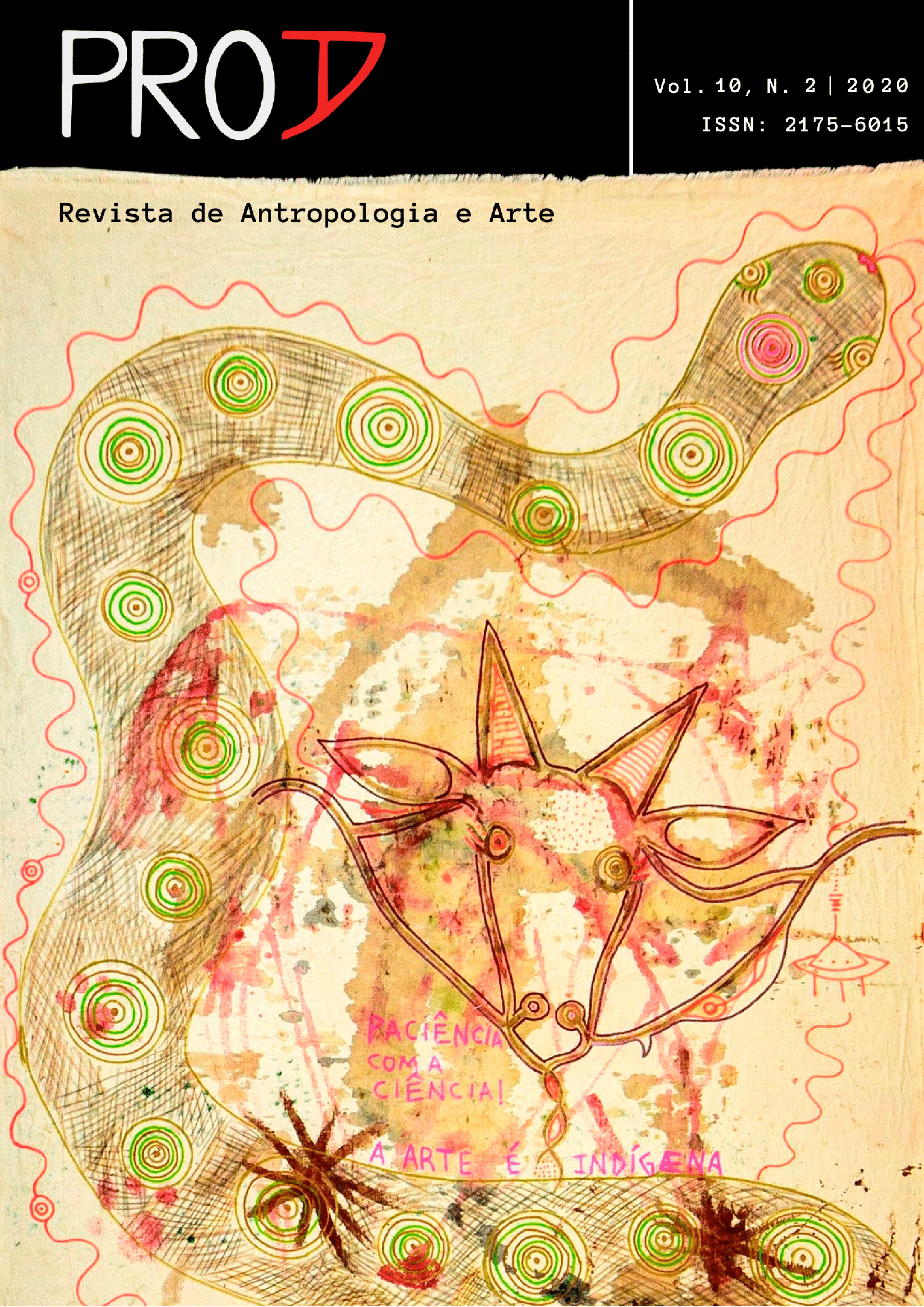Abstract
The present text is woven into the restlessness about the threshold between humanity and animality. After the discussions on language, the modulation of emotions, the consciousness of death, and reason itself, it identifies a remainder that continues to be defended by some as an exclusively human characteristic: music. The reflections presented here have their origin in the dissociation between reproduction/imitation and musical production, based on an assertion by D'Arezzo; they are reinforced by Chabanon's provocations about the non-imitative character of music and its conditions in animals, savages and children; they move towards the ideas of Derrida, where the distinctions between bestiality and sovereignty and the critique of the generic animal singular are highlighted, and of Merleau-Ponty, with the concepts of the perceived world and Unwelt.
References
ADENOT, Pauline. Les musiciens d’orchestre. De la vocation au désenchantement. Paris: L’Harmattan, 2008.AGAMBEN, Giorgio. O aberto: o homem e o animal. Trad. Pedro Mendes. Rio de Janeiro: Civilização Brasileira, 2013.
BASTOS, Rafael J.M. Musicalidade e ambientalismo na redescoberta do Eldorado e do Cara-íba: uma antropologia do encontro Raoni-Sting. Revista de Antropologia, São Paulo, Usp, v.39, n.1, pp.146-189, 1996.
BASTOS, Rafael J.M. Esboço de uma teoria da música: para além de uma antropologia sem música e de uma musicologia sem homem. Anuário Antropológico/93. Rio de Janeiro: Tempo Brasileiro, 1995. pp. 9-73.
CASTRO, Marcos C. Educação: o campo maior de aplicação da pesquisa em música. Anais – Simpósio de Estética e Filosofia da Música. Porto Alegre, v.1, n.1, pp.44-53, 2013.
CASTRO, Joana L. O sistema numérico como agente de sensibilização á hierarquia do sis-tema tonal. Aveiro, Portugal: Departamento de Comunicação e Artes da Universidade de Aveiro, 2013. Dissertação de Mestrado.
D’AREZZO, Guido. Regule rithmice. In: INSTITUTE OF MEDIAEVAL MUSIC, Guido D’Are-zzo. Regule rithmice, Prologus in antiphonarium, and Epistola ad Michahehem. Otawa, Canada: Instituto de Mediaeval Music, 1999.
DERRIDA, Jacques. A besta e o soberano (Seminário): vol.1. Michel Lisse, Marie-Louise Mal-let, Ginete Michaud (orgs). 1 ed. Rio de Janeiro: Via Verita, 2016.
DERRIDA, Jacques. O animal que logo sou. 2.ed. Trad. Fábio Landa. São Paulo: Ed.Unesp, 2011.
DERRIDA, Jacques. Cette nuit dans la nuit de la nuit... . Rue Descartes, n.42, Politiques de la commu-nauté, pp.112-127, 2003. http://www.jstor.org/stable/40978797. [Consulta: 09 de novembro de 2015].
DERRIDA, Jacques. Points de suspension. Entretiens. Elisabeth Weber (org). Paris: Galilée, 1992.
DESCOLA, Philippe. Estrutura ou sentimento: a relação com o animal na Amazônia. Maná, v.4, n.1, pp.23-45, 1998.
GOEHR, Lygia. 2012. Music is marvelous, but not mysterious. Interview. Aeon Media Group. Prod. Kellen Quin, Interv. Nigel Warburton, Ed.Adam D’Arpino. https://aeon.co/videos/mu-sic-is-marvellous-but-not-mysterious-an-interview-with-lygia-goehr. [Consulta: 12 de abril de 2019].
GOEHR, Lygia. The imaginary museum of musical works. Oxford: Claredon Press, 1992.
GRAY, P.M.; KRAUSE, B.; ATEMA, J.; PAYNE, R.; KRUMHANSL, C.; BAPTISTA, L. The Mu-sic of Nature and the Nature of Music. Science, v.291, n.5501, p.52-54, 2001.
GRUZINSKI, Serge. La pensée métisse. Paris: Librairie Arthème Fayard/Pluriel, 2012.
HODEIR, André. As formas da música. Lisboa: Edições 70, 2002.
MÂCHE, François-Bernard. La forme en musique. In: CHANGEUX, Jean-Pierre (org). La vie des formes et les formes de la vie. Paris: Odile Jacob, pp.265-281, 2012.
MERLEAU-PONTY, Maurice. Conversas. Trad. F. Landa; E. Landa. São Paulo: Martins Fon-tes, 2004.
MERLEAU-PONTY, Maurice. A Natureza: notas: cursos no Collège de France. Anot. Dominique Séglard. Trad. Álvaro Cabral. São Paulo: Martins Fontes, 2000.
MERLEAU-PONTY, Maurice. Fenomenologia da percepção. Trad. Carlos A. R. Moura. 2 ed. São Paulo: Mar-tins Fontes, 1999.
MERLEAU-PONTY, Maurice. O visível e o invisível. Trad. José A. Gianotti e Armando M. Oliveira. São Paulo: Perspectiva. 1984.
PICCHI, Achille G. A música e os inícios do homem. Mimesis, Bauru, v.29, n.2, pp. 43-48, 2008.
PINKER, S. How the mind works. 1.ed. London: Penguin Books, 1998.
RODRIGUES, Felipe V. Fisiologia da música: uma abordagem comparativa. Revista de Bio-logia, v.2, pp.12-17, 2008.
SEEGER, Anthony. Por que os índios Suyá cantam para suas irmãs? In: VELHO, G. (Org.) Arte e Sociedade: ensaios de sociologia da arte. Rio de Janeiro: Zahar Editores, 1977.
SMALL, Christopher. Musicking: the meanings of performing and listening. Middletown, Connecticut: Wesleyan University Press, p.1998.
SMALL, Christopher. The social character of music. In: Sociological review monograph 34. Lost in music: culture, style and musical evente. London/New York: Avron Levine White, Routledge & Kegan Paul, 1987.
SOUZA, Maria N.V. A Evolução da Notação Musical do Ocidente na História do Livro até à Invenção da Imprensa. Covilhã, Portugal: Departamento de Artes e Letras da Universidade da Beira Interior, 2012. Dissertação de Mestrado.
TOMÁS, Lia. A procura da música sem sombra: Chabanon e a autonomia da música no sé-culo XVIII. São Paulo: Cultura Acadêmica, 2011.
UEXKÜLL, Jacob von. Mondes animaux et monde humaines suivi de Théorie de La signifi-cation. Illustrations de Georges Kriszat. Traduction et présentation de Philippe Muller. Paris: Éditions Denöel, 1956.
UEXKÜLL, Thure von. A teoria da Umwelt de Jakob von Uexküll. Galáxia, n. 7, pp.19-48, 2004.
VALENTIM, Marco A. Extramundanidade e sobrenatureza: para uma crítica da antropolo-gia filosófica. In: I Encontro de Fenomenologia: Fenômeno/Mundo, Universidade Federal do Maranhão, São Luís/MA, 2013.
VIVEIROS DE CASTRO, Eduardo. Os pronomes cosmológicos e o perspectivismo amerín-dio. Maná, v.2, n.2, pp.115-144, 1996.

This work is licensed under a Creative Commons Attribution 4.0 International License.
Copyright (c) 2020 Proa: Revista de Antropologia e Arte

